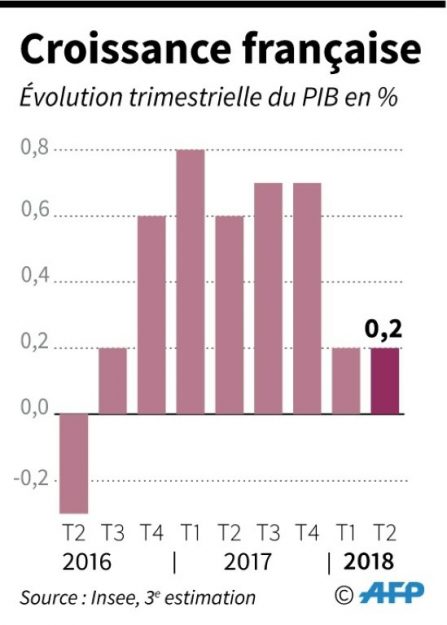Budget 2019: 6 Billion Tax Cuts for Households, Promises the Government

Monday was presented in the Council of Ministers the draft budget law for 2019. The government promises 6 billion euros of tax cuts for households. Details.
The government, criticized for its policy deemed unequal, defended on Monday the “coherence” of its draft budget 2019 by promising to restore purchasing power to households , despite savings measures decided to reduce public spending.
“The long-term goal of this budget is to build a new French prosperity, which should benefit all French and all territories,” said Finance Minister Bruno Le Maire, presenting to the press draft budget law (PLF) 2019.
Le #Budget2019 a un cap : la prospérité française. Cette prospérité doit bénéficier à tous les Français et tous les territoires. Elle ne doit pas reposer sur plus de dépenses publiques et plus d’impôts mais sur plus de création de valeurs par les Français et les entreprises pic.twitter.com/BusFGbbG6T
— Bruno Le Maire (@BrunoLeMaire) 24 September 2018
2.3 billion euros in fuel and tobacco tax
In this context, “all our commitments will be kept,” continued the minister, for whom the 2019 budget “asserts clear choices” in terms of “restoration of public finances”, but also support for “household purchasing power” And “business competitiveness”.
The PLF 2019, Macron’s second five-year budget, will thus result, according to Bercy, in a tax break of six billion euros for households, despite increases in taxes on fuels and tobacco, evaluated in total at 2.3 Billions of Euro’s.
This fiscal gesture, based mainly on a further drop in the housing tax and the removal of overtime contributions, is “the biggest tax cut for households since 2008,” insisted the Minister of Public Accounts Gérald Darmanin.
Businesses will benefit from a further reduction in corporate tax (IS) and the transformation of the Competitiveness and Employment Tax Credit (CICE) into lower expenses, a reduction of total tax of 18.8 billion euros.
A “sleight of hand”
These figures have however been questioned by several members of the opposition, who denounced Monday a “communication operation” or a “sleight of hand”.
What the executive “gives with one hand, in fact he takes it from another”, said Public Sénat the first secretary of the PS Olivier Faure, recalling that the French Observatory of economic conditions (OFCE) had estimated at 3.5 billion euros – not 6 billion euros – the expected gain in purchasing power for households next year.
“Is there a Frenchman today who can believe that they will win 6 billion? (…) It’s a sad lie, “denounced on his side the president of Debout France, Nicolas Dupont-Aignan.
#Budget2019 : la #FakeNews du jour !
Une baisse fiscale de 6 milliards d’€ en 2019 : le Gouvernement dissimule comme par hasard la hausse de 3Mds€ de taxes sur les carburants et la désindexation des retraites et prestations sociales (soit 3Mds€) ! https://t.co/45e0akFhlw— N. Dupont-Aignan (@dupontaignan) 24 September 2018
“Realistic”
The presentation of the 2019 Finance Bill comes at a complicated time for the government, faced with persistent criticism of the issue of purchasing power, but also with a slowdown in growth, which peaked at 0.2% in first as in the second quarter of 2018.
According to Bercy, the increase in gross domestic product should reach 1.7% in 2019, instead of the 1.9% initially expected. This figure was described as “realistic” by the High Council of Public Finance (HCFP), independent body to assess the credibility of forecasts of Bercy.
The Ministry of Finance has also had to live with the reform (CICE), which implies a “dark year” for public finances; the latter will indeed have to support simultaneously next year the reimbursement of the CICE for the year 2018 and the reduction of contributions decided for 2019, ie a global bill of 40 billion euros.

4164 positions removed in the public service
Despite these various obstacles, the “cap” of reducing the public deficit will be “held”, assured Bruno Le Maire. According to Bercy, it will settle at 2.8% of GDP, a figure up 0.4 point from the latest government forecast 2.4%) but below the 3% required by Brussels.
To succeed this number balancing, Bercy had to resolve to make a turn of screw on expenses.
The draft budget law will include a virtual freeze on retirement pensions, family allowances and personalized assistance to housing, which will be revaluated by only 0.3% while inflation is expected to 1.3%. What save nearly three billion euros.
Efforts will also be made to chambers of commerce and industry, public broadcasting and tax administration. Lastly, the employment policy will be put to use with a decrease in loans of 2.1 billion euros, which will include a reduction in the number of contracts assisted.
On the public service side, this slimming treatment will result in the elimination of 4164 positions on the perimeter of the State, out of a total of 50 000 planned by 2022. The ministries most affected will be the Public Accounts (2000 posts). ) and the National Education (1800).
Budget 2019 : 4.164 postes supprimés dans la fonction publique, moins qu’annoncé (gouvernement) #AFP
— Agence France-Presse (@afpfr) 24 September 2018
#Budget2019 : nouvelles coupes attendues dans la fonction publique https://t.co/rkH7xoq8WG par @cvaranges #AFP pic.twitter.com/ADMO7qlkg0
— Agence France-Presse (@afpfr) 24 September 2018
Enjoyed this? Get the week’s top France stories
One email every Sunday. Unsubscribe anytime.


